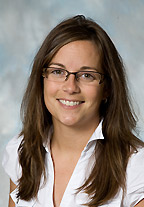Music as Motivation and Consequence in Behaviors of Individuals on the Autism Spectrum
Music has long been purported to have motivational attributes within the classroom (Standley, 1996). Whether it be through the sung delivery of directives or the reinforcement of a concept through musical production (sung or instrumental), the multi-dimensional and multimodal experience one has through music is unmatched by any other single stimulus. This presentation will provide clarity in the definition of music applied within the Applied Behavior Analysis-based procedure to include music elements as antecedents and the difference between music as a reward, reinforcers or feedback. Results of a repeated measures study on 20 children with neurodevelopmental disabilities will be discussed along with implications for the non-music therapist.
Melanie Harms, Ph.D., MT-BCAssistant Professor of Music Therapy
Wartburg College Waverly, IA Dr. Harms is the Director of Music Therapy at Wartburg College, in Waverly, Iowa. Her clinical experiences with individuals on the autism spectrum have taken her from Iowa, to the greater Los Angeles area, the Bronx, Kansas, Florida, and back again. Dr. Harms philosophy of music therapy delivery draws from neurologic, cognitive, and behavioral theories. She is invested in establishing evidence to strengthen the effectiveness of music therapy strategies and techniques, existing and emerging. Music therapy has long rested on the motivational operations of music experiences with little research evidencing the functions of individual music elements. Dr. Harms’s dissertation focused on the role of specific live music experiences as a discriminative stimulus and/or consequences of learning behaviors to elicit conversation on the application of such music experiences as antecedents as well as their varied functions as reward, reinforcement, or feedback. Dr. Harms is committed to improving the access of music therapy services to those on the spectrum. She has served on the Iowa Music Therapy Recognition Task Force since 2009, is President of the Iowa Chapter of Music Therapy, Vice President (2nd) of the Midwestern Region, and Co-Chair of the American Music Therapy Association Standards of Clinical Practice Committee. Dr. Harms also serves on the Advisory Council of the Opportunity Village Children’s Autism Center in Clear Lake, Iowa, established in 2013. She remains active in clinical practice to best inform research, the development of systematic procedures, and clinical training.
|


